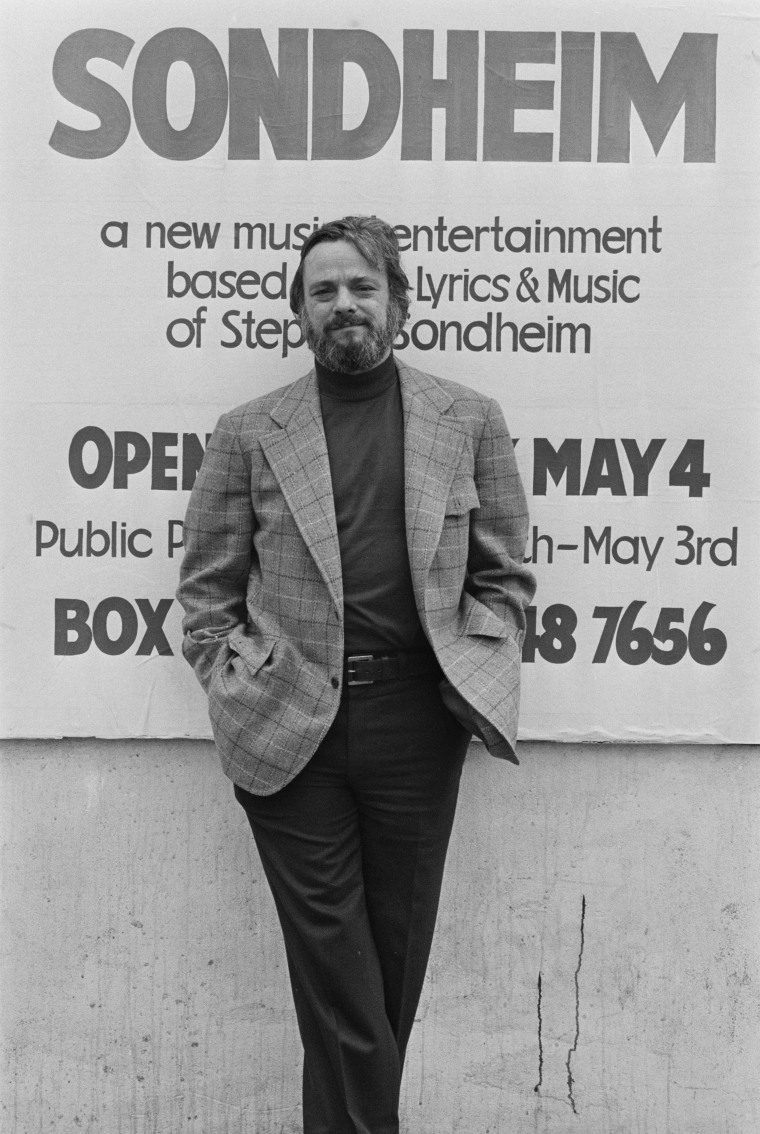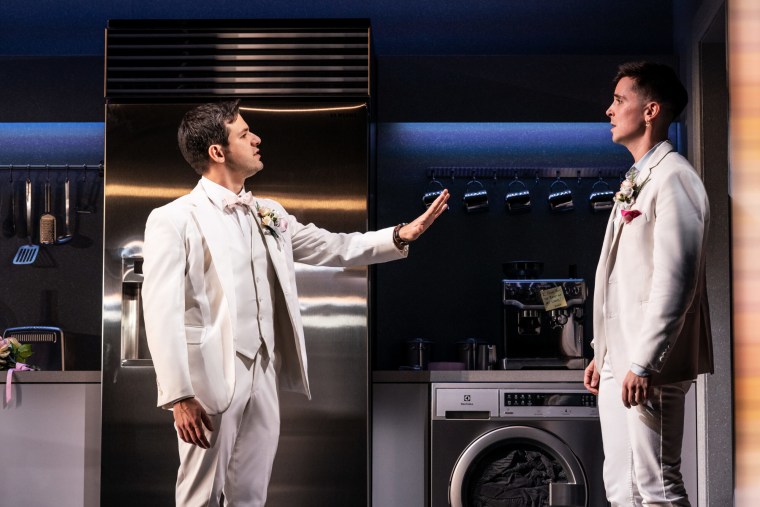Broadway is currently struggling to keep shows running after the recent COVID-19 surge hit New York City with the omicron variant. Some shows have been forced to go on hiatus, while a few have closed permanently.
One production that is seemingly thriving amid the chaos is a gender-swapped revival of Stephen Sondheim’s “Company,” playing at the Bernard B. Jacobs Theatre.
The original 1970 production was nominated for a record-breaking 14 Tony Awards and at the time was heralded for its contemporary depiction of dating, sex and marriage. Featuring a book by George Furth with music and lyrics by Sondheim, this revival, which originated in London's West End in 2018, reimagines the main protagonist Bobby as a woman, who at 35 years old is struggling to find “the one.”
All of "Bobbie's" friends are in relationships, and as the lone single woman in her social circle she is overwhelmed by the pressures from them and society to settle down. Of course, since the gender of Bobbie has been swapped so has that of her lovers, who are played by three men. But the gender of one other character has also been swapped, making a formerly straight couple now gay.

“I felt so much pressure because it’s a role and song that has been done so well by genius women and to have incredible role given to me as a man now in a very feminist production is scary. You have to live up to it,” Matt Doyle, who plays one of the gay men, told TODAY via Zoom. “I felt the world watching, especially the first time that we were doing this. The biggest thing I learned is that as long as I continue to play my truth and play it as a man and as a gay man, the further away I get from that. The biggest rut I can fall into is trying to live up to those women.”
Doyle, who is an out actor, is referring to his role of Jamie, that originally was created as Amy. Playing opposite Etai Benson as Paul, Doyle’s character has possibly one of the most demanding songs ever to grace a musical theater score. “Getting Married Today” is a rapid-fire, upbeat cry of help from a bride — or in this case a groom — with cold feet, having a panic attack just as they're supposed to walk down the aisle.
Beloved by many musical theater aficionados, the song is one of the highlights of Sondheim’s score, and is a beast for any performer who tries to pull it off. It’s deemed as the quintessential example of the heralded composer’s repertoire, giving actors loads of intricate language to be delivered at a remarkable pace.
“I grew up watching all of my heroines of comedy do this song,” Doyle, 35, said. “The first version I ever saw was Madeline Kahn in the early days of YouTube. I was floored and blown away and fell in love with the song then. She’s such a hero of mine and watching Carol Burnett do it? I mean, I’ve seen every performer that I love and admire so much do this. It was like living this weird fantasy come true. It was really scary to be completely honest.”
But Doyle delivers. Not only is his performance of the song a knock-out, but the entire scene that centers around his relationship with Paul is an endearing highlight as well in an otherwise cold production. (So much so, the audience at the performance I attended almost stopped the show to give him a standing ovation after a lengthy and thunderous applause.)

Not only are audiences wild about Doyle, so was the late Sondheim, who died on Nov. 26, 2021 at the age of 91, just a few days before “Company” officially opened on Broadway.
“He was really closely involved, especially the first time around because he was healthier then,” Doyle said of Sondheim’s involvement. “He was in the room with us, probably a couple times a week and gave notes and he loved this production. He called it the most entertaining production of a musical ever. I know he was a big fan of it. We were very blessed that we worked so closely with him up until the very end. He was there on our first preview, he was giving notes up until a couple of days before he passed. Such a shock to the system to lose him.”
Getting over his “Sondheim fears” after working together on a revival of “Sweeney Todd” back in 2017, Doyle was taken off guard this time around with Sondheim’s vulnerability. He was emotional, not only when remembering men like Furth who helped create “Company” back in 1970, but also around the gay themes of the piece that were created for this revival.
Sondheim was gay and out for most of his life, but his identity as a gay man was often an afterthought for his work and his place in the public eye. (His obituary for NBC News didn’t include any mention of his sexuality, or that he was survived by his husband of four years, Jeff Romley.)

“(Sondheim’s) favorite line in the show, and he would make sure that I knew it every single time he saw the show was, ‘I’m the next bride.’ That’s Jamie’s exit line and it was Amy’s exit line, too” Doyle explained. “It was his favorite exit line ever written. It’s nothing but joy. It’s discovery. And he would always say, ‘I need you to scream that to the heavens,’ because now — sorry, I’m going to get emotional — but now in the context of everything that he’s watched in his life, to get to this point to watch a man say that line on stage, it was such a powerful moment for him. So I think of him every single night that I say it.”
Sondheim wrote for the times he was in, so much of his work never explicitly featured gay characters. That is, until now. For all the awards he was nominated and won over his lifetime — a Pulitzer Prize, eight Tony awards, an Oscar and eight Grammys — this revival marks his first ever nomination for a GLAAD award, given to works in the media for their fair, accurate and inclusive representations of the LGBTQ community.
But what is this revival — helmed by Obie-winning British director Marianne Elliott — saying by making one of the couple — the couple getting married — gay?
Doyle points to the only full line added to the revival’s script: “Just because we can doesn’t mean we should.”
“There is an unbelievable pressure that has come into our lives in the past decade,” he added. “We fought so hard for this right. We deserved this right, but what’s happened is there is a new anxiety with gay men to fit into this heteronormative world and society now that we have this right. To define marriage for ourselves and to try and fit into an institution that is already dated and completely warped in some respects for heterosexual couples. We have to somehow make it our own. What’s something that’s so amazing about the gay community is that we are are so individualistic in what we do. We do live our own lives, our own set of rules and every couple is unique. So we’re trying to fit into this right that’s been given to us.”
Doyle believes that Paul and Jamie are very representative of gay couples living in New York City today, trying to navigate the conservative confines of marriage paired with the liberating ideals often assumed of a gay lifestyle. Doyle even trips up trying to answer whether or not the couple in the show is monogamous or not, fittingly representative of the actual confusion gay couples like Paul and Jamie are living off stage.

For Sondheim, he was most fascinated at how the musical had evolved over the last 50 years and what that represented in society, but also how audience members of differing generations perceived these changes so contrastingly from one another.
“One of the points that he made was that he couldn’t believe that some younger people in the audience didn’t recognize what a huge deal it was to have this gay couple in this show,” Doyle said. “A lot of younger audience members actually thought it was always a gay couple. That really threw him. Now how refreshing is that ... that we are moving forward in such a way that people could actually believe that a show 50 years ago would have a gay couple represented that way on stage that comfortably? But he said it was jarring to him because we fail to recognize how far we’ve progressed.”
“It’s immensely profound to stand up on that stage and to bring this piece to current audiences. It’s also such a joy to hear both sides. To speak to older audience members that say, ‘I finally feel seen and represented by this show and that’s so thrilling. Thank you.’ But also to hear somebody say, ‘It was a woman before? Oh, I didn’t know.’ That is also thrilling as well, because it shows how far we've come."